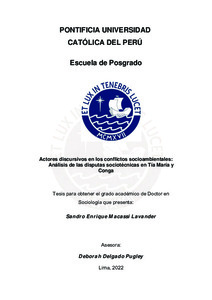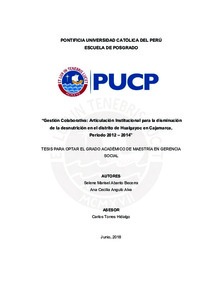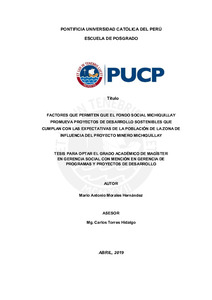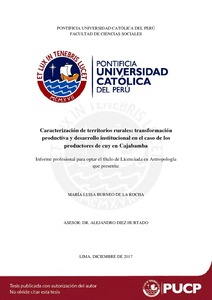| dc.contributor.advisor | Delgado Pugley, Deborah | |
| dc.contributor.author | Macassi Lavander, Sandro Enrique | |
| dc.date.accessioned | 2023-01-09T19:52:48Z | |
| dc.date.available | 2023-01-09T19:52:48Z | |
| dc.date.created | 2022 | |
| dc.date.issued | 2023-01-09 | |
| dc.identifier.uri | http://hdl.handle.net/20.500.12404/23943 | |
| dc.description.abstract | El presente estudio se enfoca en la interacción entre las redes de actores tanto de
la empresa como de las comunidades, construidas en torno a los asuntos sociotécnicos
y la participación de actores comunicativos en dichas redes, en torno a los EIA de los
megaproyectos de Tía María y de Conga en el Perú entre el 2009 y el 2012.
La revisión de la “Teoría del Actor Red” ayuda a comprender las discusiones que
emergen sobre los EIA, sin embargo, esta teoría no profundiza el rol que cumplen los
actores comunicativos. Para explicar su aporte en los conflictos socioambientales se
emplea el concepto de “coaliciones discursivas” (Hajer, 2003; Fischer 2003).
Se revisó la normatividad sobre el EIA, y se realizaron entrevistas a informantes
claves de la red de actores sociotécnica y miembros de las coaliciones discursivas. Se
analiza cualitativa y cuantitativamente la presencia de lo sociotécnico en el periodismo
tradicional y en el digital, tanto nacional como regional y local.
Se encuentra que las estrategias de comunicativas tienen un papel clave en la
conformación de la red de actores que realiza la empresa y también en la red de actores
contestataria.
Actores comunicativos y no comunicativos (ingenieros, periodistas,
instituciones, especialistas y ciudadanos de a pie) conforman las “coaliciones
discursivas. Ellos cuestionan las premisas socio-técnicas en el espacio público,
buscando afectar las decisiones gubernamentales.
Se observa un círculo virtuoso entre las coaliciones discursivas, los artefactos
sociotécnicos y las acciones de movilización para la apertura de la caja negra
(desestabilización de las premisas científicas del EIA) logrando detener la aprobación
del EIA de ambos proyectos extractivos.
Además, las coaliciones discursivas cuestionaron el sistema de evaluación
ambiental vigente creando condiciones para el desarrollo de una nueva
institucionalidad pública denominada Servicio Nacional de Certificación Ambiental
para las Inversiones sostenibles. | es_ES |
| dc.description.abstract | This study focuses on the interaction between the networks of actors of both the
company and the communities, built around sociotechnical issues and the participation
of communicative actors in these networks, around the EIAs of the Tía María and
Conga megaprojects in Peru between 2009 and 2012.
The revision of the "Network Actor Theory" helps to understand the discussions
that emerge about EIAs, however this theory does not deepen the role played by
communicative actors. To explain their contribution to socio-environmental conflicts,
the concept of "discursive coalitions" is used (Hajer, 2003; Fischer 2003).
The regulations on the EIA were reviewed, and interviews were conducted with
key informants of the network of sociotechnical actors and members of the discursive
coalitions. The presence of the sociotechnical in traditional and digital journalism is
analyzed qualitatively and quantitatively, both nationally, regionally and locally.
It is found that communication strategies have a key role in the formation of the
network of actors carried out by the company and also in the network of protest actors.
Communicative and non-communicative actors (engineers, journalists,
institutions, specialists and ordinary citizens) make up the "discursive coalitions. They
question the socio-technical premises in the public space, seeking to affect government
decisions.
A virtuous circle is observed between the discursive coalitions, the
sociotechnical artifacts and the mobilization actions for the opening of the black box
(destabilization of the scientific premises of the EIA) managing to stop the approval of
the EIA of both extractive projects.
In addition, the discursive coalitions questioned the current environmental
assessment system, creating conditions for the development of a new public institution
called the National Environmental Certification Service for Sustainable Investments. | es_ES |
| dc.language.iso | spa | es_ES |
| dc.publisher | Pontificia Universidad Católica del Perú | es_ES |
| dc.rights | info:eu-repo/semantics/embargoedAccess | es_ES |
| dc.rights.uri | http://creativecommons.org/licenses/by-nc-nd/2.5/pe/ | * |
| dc.subject | Problemas sociales--Perú--Cajamarca | es_ES |
| dc.subject | Problemas sociales--Perú--Arequipa | es_ES |
| dc.subject | Minería--Perú--Cajamarca | es_ES |
| dc.subject | Minería--Perú--Arequipa | es_ES |
| dc.subject | Problemas ambientales--Perú--Cajamarca | es_ES |
| dc.subject | Problemas ambientales--Perú--Arequipa | es_ES |
| dc.subject | Industría minera--Perú--Cajamarca | es_ES |
| dc.subject | Comunidades--Perú--Cajamarca | es_ES |
| dc.subject | Industría minera--Perú--Arequipa | es_ES |
| dc.subject | Comunidades--Perú--Arequipa | es_ES |
| dc.title | Actores discursivos en los conflictos socioambientales: Análisis de las disputas sociotécnicas en Tía María y Conga | es_ES |
| dc.type | info:eu-repo/semantics/doctoralThesis | es_ES |
| thesis.degree.name | Doctor en Sociología | es_ES |
| thesis.degree.level | Doctorado | es_ES |
| thesis.degree.grantor | Pontificia Universidad Católica del Perú. Escuela de Posgrado | es_ES |
| thesis.degree.discipline | Sociología | es_ES |
| renati.advisor.dni | 42027804 | |
| renati.advisor.orcid | https://orcid.org/0000-0002-5595-0359 | es_ES |
| renati.author.dni | 07562415 | |
| renati.discipline | 314078 | es_ES |
| renati.juror | Paredes Gonzales, Maritza Victoria | es_ES |
| renati.juror | Delgado Pugley, Debora | es_ES |
| renati.juror | Damonte Valencia, Gerardo Hector | es_ES |
| renati.juror | Torres Wong, Marcela | es_ES |
| renati.juror | Waisbord , Silvio Ricardo | es_ES |
| renati.level | https://purl.org/pe-repo/renati/level#doctor | es_ES |
| renati.type | https://purl.org/pe-repo/renati/type#tesis | es_ES |
| dc.date.EmbargoEnd | 2025-12-01 | |
| dc.publisher.country | PE | es_ES |
| dc.subject.ocde | https://purl.org/pe-repo/ocde/ford#5.04.01 | es_ES |










